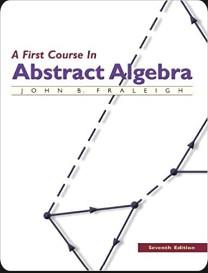Prove that N of Example 47.9 is multiplicative, that is, that N() = N()N() for ,
Question:
Prove that N of Example 47.9 is multiplicative, that is, that N(αβ) = N(α)N(β) for α,β ∈ Z[√-5].
Data from Example 47.9
Let Z[√-5] = {a + ib √5 | a, b ∈ Z}. As a subset of the complex numbers closed under addition, subtraction, and multiplication, and containing 0 and 1, Z[√-5] is an integral domain. Define N on Z[√-5] by N(a + b√-5) = a2 + 5b2. (Here √-5 = i√5) Clearly, N(α) = 0 if and only if α = a+ b√-5 = 0. That N(αβ) = N(α)N(β) is a straightforward computation that we leave to the exercises (see Exercise 12). Let us find all candidates for units in Z[√-5] by finding all elements α in Z[√-5] with N(α) = 1. If α = a+ b Z√-5, and N(α) = 1, we must have a2 + 5b2 = 1 for integers a and b. This is only possible if b = 0 and a = ±1. Hence ±1 are the only candidates for units. Since ±1 are units, they are then precisely the units in Z[√-5]. Now in Z[√-5], we have 21 = (3)(7) and also 21 = (1 + 2Z√-5)(1 - 2√-5).
If we can show that 3, 7, 1 + 2√-5, and 1 - 2√-5 are all irreducibles in Z[√-5], we will then know that Z[√-5] cannot be a UFD, since neither 3 nor 7 is ±(1 + 2√-5). Suppose that 3 = αβ. Then 9 = N(3) = N(α)N(β) shows that we must have N(α) = 1, 3, or 9. If N(α) = 1, then α is a unit. If α = a+ b√-5, then N(α) = a2 + 5b2 , and for no choice of integers a and b is N(α) = 3. If N(α) = 9, then N(β) = 1, so β is a unit. Thus from 3 = αβ, we can conclude that either α or β is a unit. Therefore, 3 is an irreducible in Z[√-5]. A similar argument shows that 7 is also an irreducible in Z[√-5].
If 1 + 2√-5 = γδ, we have 21 = N(1+ 2√-5) = N(γ)N(δ). so N(γ) = 1, 3, 7, or 21. We have seen that there is no element of Z[√-5] of norm 3 or 7. This either N(γ) = 1, and γ is a unit, or N(γ) = 21, so N(δ) = 1, and δ is a unit. Therefore, 1 + 2√-5 is an irreducible in Z[√-5]. A parallel argument shows that 1 - 2√-5 is also an irreducible in Z[√-5]. In summary, we have shown that Z[√-5] ={a+ ib√-5| a, b ∈ Z} is an integral domain but not a UFD. In particular, there are two different factorizations 21 = 3 . 7 = (1 + 2√-5)(1 - 2√-5) of 21 into irreducibles. These irreducibles cannot be primes, for the property of a prime enables us to prove uniqueness of factorization.
Step by Step Answer:






